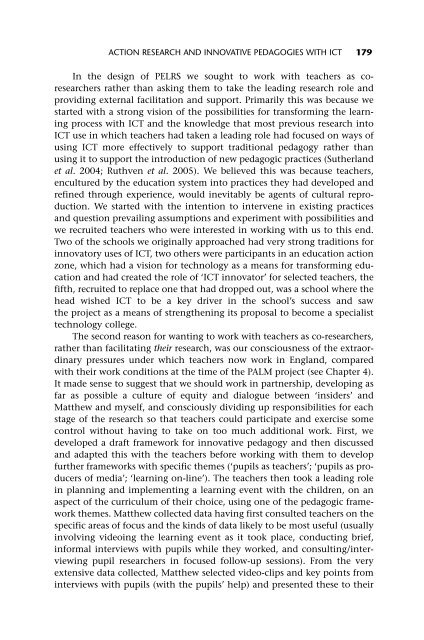Action Research A Methodology for Change and Development
Action Research A Methodology for Change and Development
Action Research A Methodology for Change and Development
Create successful ePaper yourself
Turn your PDF publications into a flip-book with our unique Google optimized e-Paper software.
ACTION RESEARCH AND INNOVATIVE PEDAGOGIES WITH ICT 179<br />
In the design of PELRS we sought to work with teachers as coresearchers<br />
rather than asking them to take the leading research role <strong>and</strong><br />
providing external facilitation <strong>and</strong> support. Primarily this was because we<br />
started with a strong vision of the possibilities <strong>for</strong> trans<strong>for</strong>ming the learning<br />
process with ICT <strong>and</strong> the knowledge that most previous research into<br />
ICT use in which teachers had taken a leading role had focused on ways of<br />
using ICT more effectively to support traditional pedagogy rather than<br />
using it to support the introduction of new pedagogic practices (Sutherl<strong>and</strong><br />
et al. 2004; Ruthven et al. 2005). We believed this was because teachers,<br />
encultured by the education system into practices they had developed <strong>and</strong><br />
refined through experience, would inevitably be agents of cultural reproduction.<br />
We started with the intention to intervene in existing practices<br />
<strong>and</strong> question prevailing assumptions <strong>and</strong> experiment with possibilities <strong>and</strong><br />
we recruited teachers who were interested in working with us to this end.<br />
Two of the schools we originally approached had very strong traditions <strong>for</strong><br />
innovatory uses of ICT, two others were participants in an education action<br />
zone, which had a vision <strong>for</strong> technology as a means <strong>for</strong> trans<strong>for</strong>ming education<br />
<strong>and</strong> had created the role of ‘ICT innovator’ <strong>for</strong> selected teachers, the<br />
fifth, recruited to replace one that had dropped out, was a school where the<br />
head wished ICT to be a key driver in the school’s success <strong>and</strong> saw<br />
the project as a means of strengthening its proposal to become a specialist<br />
technology college.<br />
The second reason <strong>for</strong> wanting to work with teachers as co-researchers,<br />
rather than facilitating their research, was our consciousness of the extraordinary<br />
pressures under which teachers now work in Engl<strong>and</strong>, compared<br />
with their work conditions at the time of the PALM project (see Chapter 4).<br />
It made sense to suggest that we should work in partnership, developing as<br />
far as possible a culture of equity <strong>and</strong> dialogue between ‘insiders’ <strong>and</strong><br />
Matthew <strong>and</strong> myself, <strong>and</strong> consciously dividing up responsibilities <strong>for</strong> each<br />
stage of the research so that teachers could participate <strong>and</strong> exercise some<br />
control without having to take on too much additional work. First, we<br />
developed a draft framework <strong>for</strong> innovative pedagogy <strong>and</strong> then discussed<br />
<strong>and</strong> adapted this with the teachers be<strong>for</strong>e working with them to develop<br />
further frameworks with specific themes (‘pupils as teachers’; ‘pupils as producers<br />
of media’; ‘learning on-line’). The teachers then took a leading role<br />
in planning <strong>and</strong> implementing a learning event with the children, on an<br />
aspect of the curriculum of their choice, using one of the pedagogic framework<br />
themes. Matthew collected data having first consulted teachers on the<br />
specific areas of focus <strong>and</strong> the kinds of data likely to be most useful (usually<br />
involving videoing the learning event as it took place, conducting brief,<br />
in<strong>for</strong>mal interviews with pupils while they worked, <strong>and</strong> consulting/interviewing<br />
pupil researchers in focused follow-up sessions). From the very<br />
extensive data collected, Matthew selected video-clips <strong>and</strong> key points from<br />
interviews with pupils (with the pupils’ help) <strong>and</strong> presented these to their

















